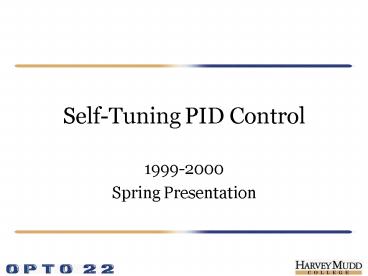SelfTuning PID Control PowerPoint PPT Presentation
1 / 19
Title: SelfTuning PID Control
1
Self-Tuning PID Control
- 1999-2000
- Spring Presentation
2
Classic PID Algorithm
m controller output e error Kc controller
gain
Ti integral time Td derivative time Ts
sampling period
3
Our Approach
- Implement classic PID algorithm with integral
windup provisions in Visual Basic on a PC,
interfacing between PC and B3000 via Ethernet - Implement self-tuning method
- Use an Athena controller as a benchmark to verify
controller performance
4
Athena Control
5
Opto22 vs. Athena Control No Integral Windup
6
Opto22 vs. Athena Control With Anti-Windup
7
Self-Tuning Approach
- Process response curve method
- Gather data from open-loop plant response to unit
step input - Examine data set to find maximum slope
- Determine ? and ?
- Use tuning relations to generate PID constants
- Compare with Athena
8
Open Loop Response Method
- Approximates higher order plants as first order
with pure delay - Plot open loop plant response to step input
- Graphically derive ? and R
- PID settings Kc 1.2/R?
- Ti 0.5/?
- Td 0.5?
9
Athena Autotune Process
10
Self-Tuning Plant Response Approximation
11
Self-Tuning Results
12
Gain Scheduling
- Thermal Plants require different PID constants at
different setpoints - PID constants can be adjusted as a function of
setpoint and system parameters, q and t - Investigated variation of Athena PID constants as
a function of setpoint and system parameters for
multiple plants
13
Gain SchedulingPID Parameters Vs. Setpoint
14
Gain SchedulingCoefficients vs. q / t
15
Gain SchedulingCoefficients vs. q / t
16
Gain SchedulingFinal Equations
Given q, t, setpoint, ambient, max temp
17
Gain Scheduling Effects on Control
18
Gain Scheduling Results
- Gain Scheduling through this method is definitely
possible, although it requires extensive data
collection - Data only covers 0.056
- Need more PID Values vs. q/t to cover 0
- Assumption Gain Schedule is related solely to
q/t - Gain Schedule based on Athena results - first
principles? - Possible Recommendations
- Automate data collection to perform autotune on
Athena - Investigate first principles involved in gain
scheduling
19
Acknowledgements
- Team Members
- Jake Stern (Leader)
- Peter Scheidler
- Michael Messina (Spring)
- Michael Helfen (Spring)
- Adi Drost (Fall)
- Ari Moradi (Fall)
- Opto 22 Liaison
- Rene Gamero 99
- Faculty Advisor
- Prof. Carl Baumgaertner

